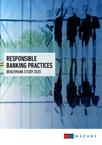
Responsible banking practices: Benchmark study 2020
Whether it’s supporting environmental initiatives or acknowledging its societal impact, the banking industry is on a mission to operate responsibly and embed sustainability into its very purpose and value proposition. More recently, the Covid-19 pandemic has brought to the fore the importance of the positive role the banking sector can play with both governments and regulators looking to banks to provide support to corporates and customers, keep the economy going and help mitigate the economic effects of the Covid-19 crisis.
„Covid-19 has reaffirmed the positive role the banking sector can play by working with governments and regulators to keep the economy going. These findings should remind banks that the crisis is an opportunity to look beyond immediate priorities, re-assess their purpose and values and use some of the best practice outlined in our report to truly embed ESG factors in their decision-making on investments for the good of the business, their clients and society.“ - Leila Kamdem-Fotso, Partner at Mazars
To assist banks and their stakeholders to ascertain where they stand, this benchmarking study examines the sustainability practices of a sample of 30 banks who are UNEP-FI Members and/or signatories to the Principles for Responsible Banking, to compare them and identify, where possible, examples of best practice. Our research is based on publicly available information, including the banks’ CSR reports. Our assessment methodology which is described in more detail in the report, leveraged guidance as to “what good looks like” from the UNEP FI.
Our assessment shows that although many banks report working towards embedding sustainability, this is not always yet reflected in their corporate strategy, governance and policies. Much work remains to be done for ESG factors to be fully integrated in banks’ risk management framework.
Overall, only three out of the 30 banks assessed were identified as demonstrating best practice across a wide range of sustainability factors (Leaders), with 10 banks identified as showing a sustainable approach across some factors (supporters) and 17 banks identified as indicating limited evidence of a sustainable approach across most factors (followers).
Download our full study to learn more about how banks are integrating environmental, social and governance criteria into their commercial strategies and risk management frameworks.
Want to know more?





